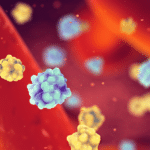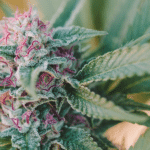One week it’s a bad study on hydroxychloroquine, next it’s a shoddy report hyping cannabis’s antiviral potential. In fact, the only thing that seems to outpace the burgeoning list of retracted research is the onslaught of new papers on COVID-19. A recent paper from French researchers at the university of Toulouse threw in a theory from way out of left field. They proposed that Rimonabant – an ill reputed anti-obesity drug withdrawn from the European market – ought to be used to treat COVID patients.
Rimonabant was briefly prescribed for weight loss, being the first approved cannabinoid “antagonist” – a drug that shuts down CB1 cannabinoid receptor activity throughout the brain and body. It was withdrawn within two years of its approval for causing depression and suicidal thoughts, among other side effects. While shutting down the “munchies” receptors, Rimonabant also blocks many of the brain’s pathways to feel pleasure.
So why treat COVID patients with Rimonabant, according to these French researchers? Because obese people fair worse when afflicted with COVID. And some 35-40% of adults in the United States are obese, which leads to a host of health problems that weaken the body and increase susceptibility to diseases, including COVID.
But that’s about as far as the logic seems to go. Addressing the steadily growing weight problem would be a public health boon, well beyond the current covid crisis. This doesn’t explain why the French researchers propose using Rimonabant in the ICU. Nor does it address the issue that forced Rimonabant off the EU market: it was deemed too dangerous to use on a day-to-day basis for weight loss. Why would COIVD have changed that?
Adrian Devitt-Lee is a research scientist and longtime Project CBD contributor. © Copyright, Project CBD. May not be reprinted without permission.
Recommended Readings
Cannabis & COVID-19: Breaking News or Bogus Science?
A molecular biologist deconstructs sensationalist claims that cannabis can prevent or treat the coronavirus.
Cannabis, CBD & COVID-19
What science says about CBD as an anti-viral agent. And, how prohibition is making a bad situation worse.
CBD as a Steroid Sparing Treatment
Could cannabidiol be a breakthrough therapy to replace or lessen the use of steroids?










